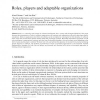Free Online Productivity Tools
i2Speak
i2Symbol
i2OCR
iTex2Img
iWeb2Print
iWeb2Shot
i2Type
iPdf2Split
iPdf2Merge
i2Bopomofo
i2Arabic
i2Style
i2Image
i2PDF
iLatex2Rtf
Sci2ools
AO
2007
2007
Roles, players and adaptable organizations
Role is a commonly used concept in software development, but a concept with divergent definitions. This paper discusses the characteristics of roles in software organizations, and contrasts such organization roles with other player-centric conceptions. Roles in organizations have their own identity and do not depend on role players for their existence. In software terms, such roles are first-class runtime entities rather than just design concepts. We define characteristic properties of both roles and players in organizational contexts, and show how the boundary between a role and its player varies depending on the level of autonomy the player is allowed. We show how roles can facilitate the separation of structure from process facilitating greater adaptivity in software. The problem of preservation of state in role-based organizations is also discussed. Possible implementation strategies for both roles and players are discussed and illustrated with various role-oriented approaches t...
| Added | 08 Dec 2010 |
| Updated | 08 Dec 2010 |
| Type | Journal |
| Year | 2007 |
| Where | AO |
| Authors | Alan W. Colman, Jun Han |
Comments (0)

